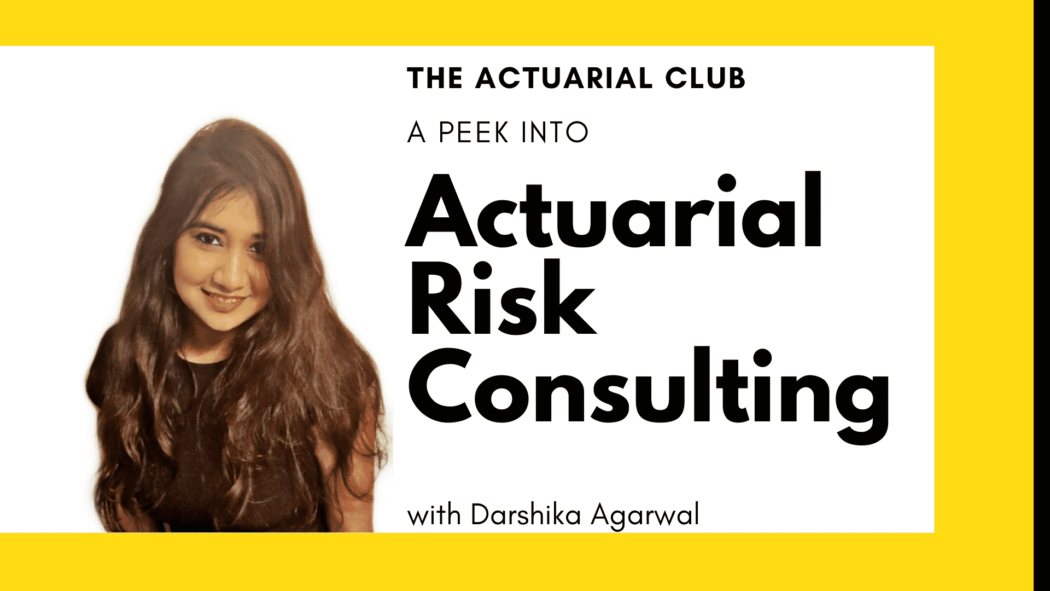Darshika, an actuary in the making, has been working as a Senior Actuarial Associate with the Strategic Risk Consulting team at Willis Towers Watson, Mumbai for the past 2 years. A St.Xaviers College graduate, she has cleared 10 actuarial papers. We caught up with Darshika to share her experience with the Actuarial Risk Consulting industry.
TAC: What is beneficial – starting with a consulting or a core insurance?
Darshika: In my opinion, the experience you gain working for a consulting vs a core insurance firm is very distinctive. While an insurance company allows you to build expertise and specialize in a particular function, a consulting set-up offers you versatile work across various functions. Consequentially, there is no straight answer to this question, it depends on what you are interested in. I preferred starting with a consulting set-up, because it gave me an opportunity to explore a lot of facets of the general insurance work like pricing, risk quantification, reserving and Solvency-II reporting, which I found to be extremely interesting. You can always move on to an insurance company after working with a consulting firm, as you get a fair idea how each of the above works and you can make a well-informed choice
TAC: How are Actuaries involved in Risk Consulting and what are their responsibilities?
Darshika: Actuaries as professionals are managers of risk and uncertainty. In General Insurance Risk Consulting, we help corporates analyze and mitigate their commercial risks. Let’s say an X company is concerned about n number of risks, we perform a detailed review of their risks, help them price their insurable risks, assist in reserving decisions and give them a holistic view of what they should be prepared for. It’s interesting how these risks are so varied across industries – what’s considered a significant risk in a power generation company might not be the most concerning in a confectionary company
TAC: What is the work that is usually performed in Solvency-II Capital Modeling?
Darshika: Solvency-II is a risk-based capital regime for insurance companies and captives, prevalent in the European Union. We assist them in the calculation of their capital requirements, which are determined on the basis of a 99.5% value-at-risk measure over one year, meaning that enough capital must be held to reduce the risk of insolvency.
TAC: Usually which tools and software are used for performing risk Quantification, Capital Modelling, Pricing, and Reserving?
Darshika: This can vary from company to company. We use VBA based excel tools, in-house software like Igloo, ResQ, Property Quantified, Cyber Quantified, etc.
TAC: Which are some of the interesting projects which you have worked on?
Darshika: Most projects that we work on are quite unique and challenging. I once worked on a power generation company trying to quantify their downtime with almost no numerical data. Another one was for a bank, planning to invest in oil storage and wanting to understand how risky it would be, again with no data at all.
These projects are quite demanding as you then end up understanding, for example, exactly how oil storage works, quite what an actuary usually wouldn’t be remotely interested in
Darshika Agarwal on Actuarial risk consulting
TAC: Are Actuaries also involved in sales pitching?
Darshika: Yes, it’s important that the actuaries themselves are involved in the sales pitch, to be able to explain to a prospective client how our analysis can help them save money and have a better understanding of their risk. Actuaries are experts at communicating technical information to a strictly non-technical audience in the simplest manner.
In most consultancies, actuaries are involved in the entire process end-to-end: from the sales pitch to the analysis and final presentation
TAC: What path an actuarial fresher should adopt in case they want to join a Risk Consulting team?
Darshika: As a fresher, I understand that it’s not possible to know the practical details about any particular actuarial field, or for that matter, what field you want to get into. Even if you could get a theoretical idea through research, the more important question is: What does a normal day in their workplace look like? To get an answer to that question, it’s indispensable to connect with experienced professionals to get some insights. Do your research on what companies have consulting teams, connect to seniors, apply through all job portals. Also, an insider tip, one skill that is valued the most in a consultancy is your communication skill!
TAC: How can a person be engaged in multiple domains within an MNC?
Darshika: Today, actuaries work not just in the insurance companies but also in investment and management consultancies, financial services, banking, stock exchange, pension funds, academics, and many other fields. If, for example, you are with the general insurance team of a particular company, who also hire actuaries for pension funds (and if that interests you), you can always take the help of the internal transfer team.
Feel free to connect with Darshika on her Linkedin!
*Disclaimer: Please note that the views above are my own and do not necessarily reflect those of my employer

